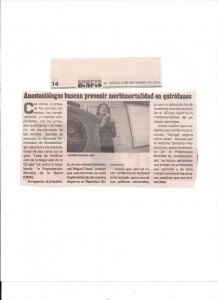Dominican Republic Headlines!
Lifebox was selected as of the Nominet Trust’s 100 organisations using tech for good, and we know our way around social media.
But there’s something special about seeing our name in fresh, inky, smudgeable print – particularly when the stories are so right on!
In September we took part in a workshop in the Dominican Republic, all around safer surgery through pulse oximetry and the Checklist. Reporters from El Nuevo Diario and El Dia, two leading newspapers in the DR, joined safer surgery champions from across Latin America, our co-founders at the WFSA and friends at the ASA to tell the story of this urgent shift in global health.
Safer surgery is a global concern, and it’s thrilling to see the Dominican Republic Ministry of Health join our colleagues taking a stand – and to share this landmark moment with you (in print and in translation…).
 Anaesthesiologists seek to prevent morbidity and mortality in surgery
Anaesthesiologists seek to prevent morbidity and mortality in surgery
The Dominican Society of Anaesthesiology is training specialists to use the World Health Organization (WHO) Surgical Safety Checklist, with the goal of reducing adverse events, complications and deaths across the preoperative process, and improving national compliance with basic standards of care.
The president of the society, Miguel Cotes, stated that the society is now involved with implementing the Checklist across the whole of the Dominican Republic.
The Ministry of Health has taken on the Checklist as one of its national policies, he explained, emphasising that correct use has shown a reduction of 40% in morbidity and mortality of surgical patients.
Cotes made the announcement during a conference entitled ‘Safe Surgery Saves lives’ led by Dr Carolina Haylock-Loor who is a member of the World Federation of Societies of Anaesthesiologists (WFSA). She’s a leader in efforts to ensure that the Checklist is used in the correct way, to stop preventable medical errors from taking place.
 Initiative: The Ministry of Health has approved this system as his policy, explained Miguel Cotes
Initiative: The Ministry of Health has approved this system as his policy, explained Miguel Cotes
Dominican Republic implements a Checklist for reducing surgical deaths: Specialists trained doctors in the country in the use of the ‘checklist’
The World Health Organization (WHO) launched the Surgical Safety Checklist in order to reduce the number of surgical deaths worldwide.
It is designed to prevent adverse events and complications related to surgical cases, and to improve compliance with basic standards of care, explained Dr Carolina Haylock-Loor, who is part of the WFSA’s executive council.
The Safe Surgery Saves Lives conference, which was led by specialists from the Dominican Society of Anesthesiology, emphasised that through complying with these basic care norms, it was possible to better guarantee the safety of the patient – and of the doctor.
Haylock-Loor explained that the Checklist is a guide which approaches safety through anaesthesia practice, avoidable surgical infections, correct interaction with the patient at the correct site, monitoring drugs,, prevention of haemorrhage, and aspiration.
The president of the Honduran Society of Anaesthesia, during her speech, gave several examples of importnt communication between members of surgical teams during the whole preoperative period (before, during and after the surgery).
Miguel Cotes, president of the Dominican Society of Anaesthesiology, announced that right now they’re implementing the Checklist across the country – and that the Ministry of Health has taken it on board as as a national policy.
“With the application of the Checklist you can see a 40% reduction in morbidity and mortality of the surgical patient,” he explained.
Working together
Cotes said that in order to launch this programme, it would be necessary for the surgical team (the surgeon, nurse, anaesthetist) to apply the process together – similar to airline pilot safety processes in planes before take off and landing.
The medical professional undertook different workshops with specialists in the capital and in Romana.
Something more: Donation
This training counted on the support of the Lifebox Foundation, a global health charity that provides a piece of surgical equipment (a pulse oximeter) and training in order to make surgery safer.

